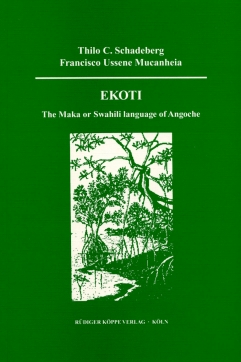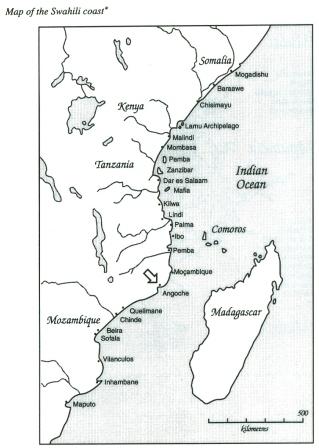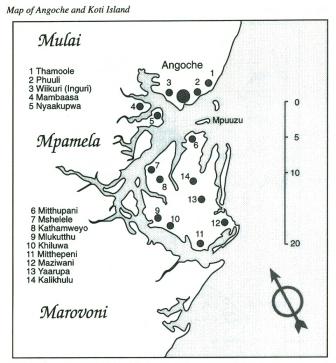


Ekoti – The Maka or Swahili Language of Angoche
Author: Thilo C. Schadeberg, Francisco Ussene Mucanheia. With a preface by: José Ibraimo Abudo. Series edited by: Bernd Heine, Wilhelm J.G. Möhlig †.
Series: EALD East African Languages and Dialects Volume 11
200014 pp. Roman, 272 pp.
2 maps, 1 b/w photo, 2 genealogical charts, numerous tables and charts, EKoti–English / English–EKoti vocabulary
Text language(s): English
Format: 160 x 240 mm
600 g
Paperback
€ 69.80
Buy 'Ekoti – The Maka or Swahili Language of Angoche' as a downloadable PDF document directly from our online shop »
Order 'Ekoti – The Maka or Swahili Language of Angoche' as print edition »
EKoti is the name of the Bantu language (P.311) which is spoken by the Koti people on Koti Island and on the mainlaind directly across the island, in Angoche, the capital of the district of the same name, in the province of Nampula, Mozambique. EKoti is spoken by a small but growing number of people, with a number of speakers of 64,200 in 1997, as compared to 30,000 in the 1960s. The co-author of this grammar, the linguist Francisco Ussene Mucanheia, is himself a native speaker of this language.
EKoti is a mixed language which originally developed from a southern Swahili dialect but has been significantly influenced in its structure by Makua, a dialect belonging to the Makhuwa group. Thus, EKoti is neither a dialect of Makua (P.30) nor a dialect of Swahili (G.40). The term Maka, used in the sub-title of this book, refers to the cultural and historical identity of the people of Angoche who call themselves the Maka.
This grammar of EKoti is divided into two sections: The first part consists of an introduction to the history and classification of the language, and of a comprehensive grammar with chapters on phonology, the morphology of nouns, adjectives, pronouns and numerals, verbal morphology, the use of tense, aspect and mood, and predication. The second part comprises a collection of EKoti texts with interlinear translations into English, and an extensive EKoti–English, English–EKoti vocabulary with approximately 1,600 entries.
Under these links you will find publications by Thilo Schadeberg and grammatical descriptions, text collections and dictionaries of further eastern and southern African Bantu languages:
Accompanying material:
- A Dictionary of the Rumanyo Language
(ISBN 978-3-89645-601-4 ) - A Grammar of Yeyi
(ISBN 978-3-89645-549-9 ) - A Grammatical Sketch of Rugciriku (Rumanyo)
(ISBN 978-3-89645-542-0 ) - A Learner’s Chichewa and English Dictionary (N.30)
(ISBN 978-3-927620-10-0 ) - A Modern Runyoro-Rutooro Grammar (J.10)
(ISBN 978-3-89645-023-4 ) - Bantu Languages
(ISBN 978-3-89645-705-9 ) - Bridging the Unbridgeable
(ISBN 978-3-89645-275-7 ) - Dialektologie des Komorischen
(ISBN 978-3-89645-702-8 ) - Domains and Regions in Bantu Tense and Aspect
(ISBN 978-3-89645-772-1 ) - Issues in Bantu Tonology
(ISBN 978-3-89645-033-3 ) - Legenden, Märchen und Fabeln aus Ruanda
(ISBN 978-3-89645-743-1 ) - Lucazi Grammar
(ISBN 978-3-89645-038-8 ) - Mgombato – Digo-Swahili-English Dictionary
(ISBN 978-3-89645-700-4 ) - North-South Contributions to African Languages
(ISBN 978-3-89645-889-6 ) - Reference Grammar of Herero (Otjiherero)
(ISBN 978-3-89645-602-1 ) - Tales, Fables and Narratives of Rwanda
(ISBN 978-3-89645-745-5 ) - Wörterbuch Kinyarwanda–Deutsch
(ISBN 978-3-89645-588-8 )
Cross-reference:
- A Sketch of Swahili Morphology
(ISBN 978-3-927620-16-2 ) - A Sketch of Umbundu (R.11)
(ISBN 978-3-927620-15-5 ) - Kinyamwezi
(ISBN 978-3-927620-40-7 ) - Nuba Mountain Language Studies
(ISBN 978-3-89645-427-0 ) - Tira and Otoro
(ISBN 978-3-89645-173-6 )
Reviews
This work is assigned for linguists and students of African languages. At the same time it is indirectly involved in the discussion concerning the fate of minority languages in Africa, since Ekoti speakers, about 64,000 in number (1997), compose only a diminutive part of Mozambique’s population, comprising 18 mln inhabitants.
According to the authors, „Ekoti might be considered a small language, but it is not a dying language. On the contrary, it has been a growing language during the past decades [...]” (p.1). The existence of such a vivid minority language opposes, to a certain degree, the spreading standpoint that minority languages are gradually losing the struggle with dominant African and imported languages, among other things, as a result of the governmental language policy of exclusion and glottoeconomics [...]
Rajmund Ohly in Studies of the Department of African Languages and Cultures, 30/2001, 83-86
| « back | Print version | [top] |
 Books
Books Audio
Audio Biographies
Biographies Series
Series Festschrifts
Festschrifts Journals
Journals